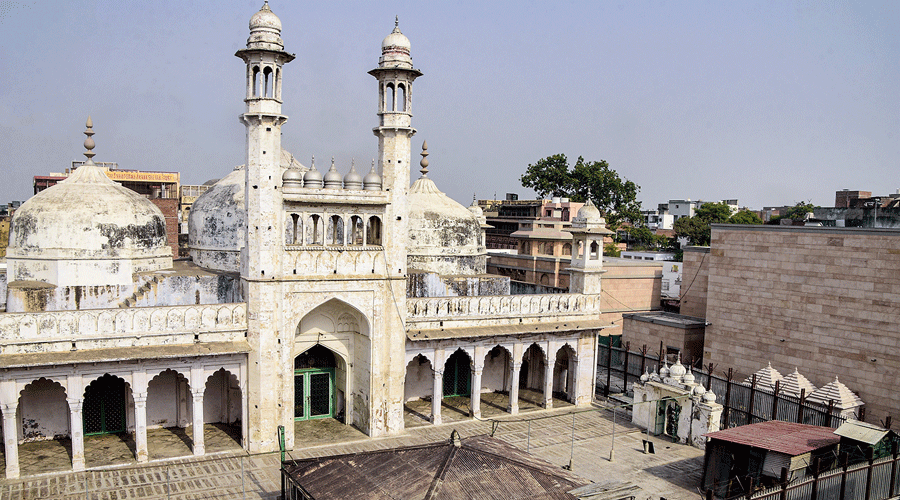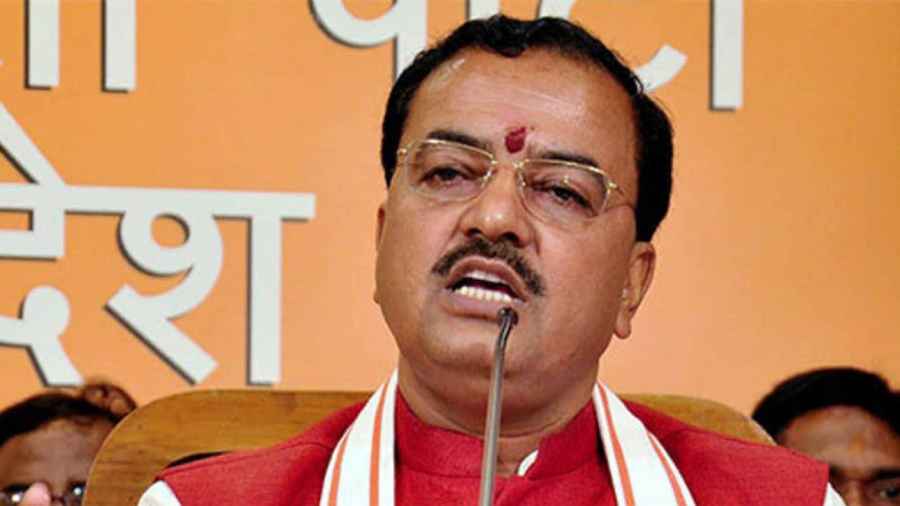The BJP core leadership maintained tactical silence but members of the wider Sangh parivar, including some ministers, a chief minister and a deputy chief minister, appeared unable to suppress their joy at a Varanasi court’s ruling to examine the right of Hindus to worship on the premises of the Gyanvapi mosque adjoining the Kashi Vishwanath temple.
“Shiv hi satya hai (Lord Shiva is the truth),” tweeted rural development minister Giriraj Singh after the court ruling.
“Jai Baba Vishwanath! Har Har Mahadev,” was the response of Madhya Pradesh chief minister Shivraj Singh Chouhan.
Uttar Pradesh deputy chief minister Keshav Prasad Maurya could not resist tweeting: “Karwat leti Mathura, Kashi (Mathura and Kashi turn sideways)!”
Maurya’s tweet referred to the two other religious disputes, in addition to Ayodhya, raised by the BJP in the past.
Although these leaders did not explicitly link their tweets to the court ruling, they left little unsaid. While speaking to news channels, they welcomed the verdict.
Giriraj, a cabinet minister in the Narendra Modi government, went to the extent of indirectly appealing to the Muslim community to forgo its claim over Kashi and Mathura.
“I want to appeal to the Muslims that Kashi and Mathura are cultural icons of Bharat. For us (the Hindus), Mecca and Medina are all here,” he said, asking whether Muslims can deny that Aurangzeb and some other invaders had destroyed temples.
This surround sound of delight from the ruling dispensation, even as the core leadership chose to remain silent, is being seen as a ploy to allow the polarising issue to simmer while maintaining distance from it.
In the recent past, BJP chief J.P. Nadda had stressed that the party had no role in the fresh Gyanvapi controversy. “Courts and the Constitution will decide issues like Gyanvapi,” Nadda had said. His response had come in May this year when the Gyanvapi issue had hit the headlines amid claims that a Shivalinga had been found on the premises.
Internally, however, party leaders appeared joyous over the court’s ruling, terming it a “big victory” for Hindus, confident that the issue would simmer in the run-up to the bunch of state elections this year and next year and finally the 2024 Lok Sabha polls.
“We don’t need to speak. The issue is acquiring a momentum of its own,” a party leader said.
The Vishwa Hindu Parishad, which had led the Ram Janmabhoomi movement in the 1980s till the BJP officially took it over and reaped political dividends, came out to celebrate the court ruling, saying the "first hurdle to the Gyanvapi temple’s liberation has been crossed”.
“The first hurdle has been crossed. Now the court will examine the matter on its own merit. We do hope and look forward to a victory. The law, justice and truth are with us,” VHP working president Alok Kumar said.
BJP sources said that although their leadership would maintain silence, it cannot stop party members and outfits like the VHP from speaking about the issue as it concerns the sentiments of Hindus, who form the party’s core support.
Former Union minister Uma Bharti, a leading player in the Ram Janmabhoomi movement, too, welcomed the ruling and urged Muslims to go for an out-of-court settlement, taking into account the faith of the Hindus.
The BJP and the RSS had decided not to pursue the Kashi and Mathura controversies after the Supreme Court handed over the Babri Masjid site to Hindus to build a Ram temple.
The party still maintains the same position but many leaders feel that given the way the Gyanvapi issue is taking shape, they may be forced to speak out on the subject in the days to come.
They believe that questions will be raised also over the maintainability of the 1991 Places of Worship Act, which prohibits the conversion of any place of worship and calls for maintenance of their religious character as they existed on August 15, 1947.
The BJP has been against the 1991 act. Many party leaders said that after Monday’s court ruling on Gyanvapi, the law could become untenable and this could open the door for questioning the religious character of several mosques in the country.












